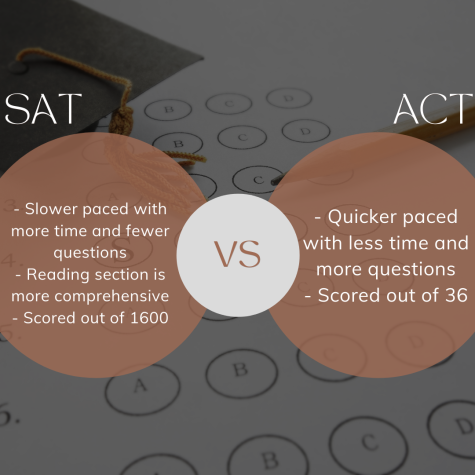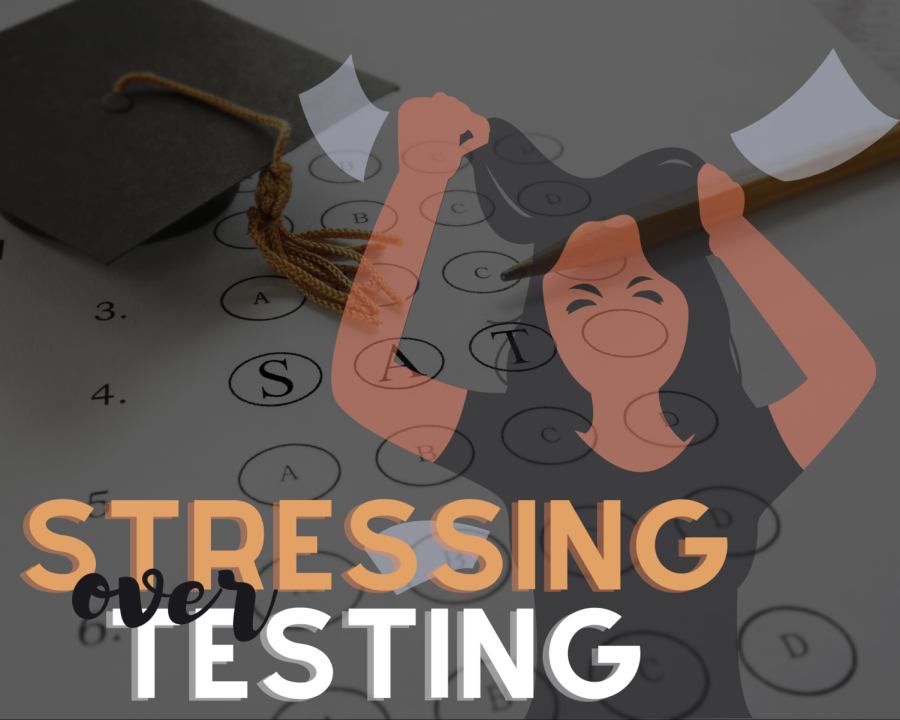Stressing Over Testing: Standardized Test Scores are Overrated
Saanvi Tatipalli made with permission from Canva
The SAT. Students are spending much time studying for a test that is unlikely to help in their future professions – and it makes sense. Although these scores are pretty important towards your chances to getting into college, schools have gone easier on the importance of them since the COVID crisis.
April 13, 2022
Remember the anxiety you had the night before the SAT or ACT, when you thought that this test will make or break your future?
Remember cramming everything last minute, ignoring the dribbles of sweat pouring down the side of your face?
Remember your fingers shakily gripping the pencil as the time ticked closer every second? Fun. Right?
Nope!
During high school, students spend countless months preparing for the SAT or ACT, two standardized tests that students take for college admission. However, as they study, many students start to wonder how these assessments will help them as they enter the real world. What is the point of them?
They simply act as a metric scale for colleges to compare students, to make colleges more successful in having a focused student body with similar goals.
The standard ACT test is scored out of 36 points and includes four sections: science, math, and English Language Arts.
The standard SAT test contains four sections as well, except they are more focused on math and English Language Arts. The score is based on a range from 40 to 1600 points.
Thankfully, CollegeBoard is facilitating several significant changes in the test-taking process in the coming years. Among these changes, the SAT is now online and significantly shorter, helping students transition towards the online learning changes.
Additionally, due to virtual transition, College Board is able to release scores to students earlier and faster. All of these changes will be take effect by 2024.
However, with all standardized tests, the SAT and ACT cannot accurately measure a student’s value. Many factors contribute to what makes a great student, such as their morals, disposition and work ethic, not simply their test-taking ability. While it is true that those skills are typically present in the highest scorers, that is not always the case. This is why many colleges strongly consider other parts of a student’s application (apart from their test scores), taking a more holistic approach in reviewing applications.
Plus, many students – around 40% to 60% – experience test anxiety, a condition where students tend to have peak amounts of stress preceding important exams, which prevents them from scoring as they should and showing their true potential.
South Forsyth Counselor, Ms. Shari Frankel, shares her perspective on how students can alleviate this stress.
“One strategy to reduce stress over the test-taking process is to visit the ACT/SAT websites to see when they are being offered to make a plan of action,” mentioned Ms. Frankel. “Being prepared can help to reduce stress.”
Every individual exhibits different talents, strengths, and weaknesses, which means they can’t all excel in the same way. This beautiful aspect of being human is also why a single test cannot rank a student’s worth.
Moreover, COVID-19 created many challenges in the test-taking process, which have had lasting, yet uneven results for online-learning students. Still, school systems persevered through it and are making notable amends. This has led to a rise in the test-optional movement, where students are able to choose whether or not they want to submit their SAT/ACT scores. Many colleges are joining the test-optional movement, including those at the top of the charts like Harvard. Most students favor this option. In fact, 83% of students actually prefer to dictate whether or not they want to send their results to colleges. We think that as we progress, these test scores shouldn’t be given the amount of attention they receive right now.
While studying for tests like these, however, students do learn and get better at subject areas like reading comprehension with repeated attention to these tests. They also give students second chances to prove themselves to colleges if their GPAs aren’t as high as they would like.
The PSAT also allows top students who accel academically to earn prestigious merit-based scholarships, helping boost their future aspirations.
Still, despite all this, parents spend tons of money to put students in classes with a lot of stress to improve their chances of achieving the magical 1600.
This makes it somewhat unfair, because students who come from higher-income families have better chances due to their increased economic resources, which can be used to pay for tutoring and various preparatory activities. This disadvantage also applies to ethnic minorities, which statistics show are less likely have the income necessary to prepare. The primary flaw of these tests isn’t their purpose, but more so, their execution and their impact on the student body.
Ultimately, there is a lot of stigma around getting the “perfect score” on tests like these during high school years, but other activities like extracurriculars are just as important to your application. The SAT and ACT tests are both beneficial in terms of testing students’ practical knowledge, but, in total, we should start moving away from tests like these that won’t necessarily help students learn and grow by taking stressful, hour-long tests that colleges are moving away from too.





